|
|
|
Sort Order |
|
|
|
Items / Page
|
|
|
|
|
|
|
| Srl | Item |
| 1 |
ID:
113992
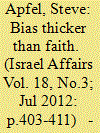

|
|
|
|
|
| Publication |
2012.
|
| Summary/Abstract |
There are several paradoxes in the propaganda war against Israel. The most puzzling of them perhaps would be the way many Christian groups and churches side with the Palestinians. On the evidence one would expect the opposite. Believing Christians have every logical reason to be pro-Israel, where alone in the Middle East Christendom's holy sites are protected; where Christians may pray openly; and where Christian followers face no pressures to convert. On the Palestinian side none of those freedoms exist. How in that case can one explain groups like the Presbyterians, the World Council of Churches, Christian Aid and so forth aiming their missiles at the Jewish state? Bringing together religious doctrine, life-preserving motives and naked bias, this article seeks to provide answers to the paradox of Christianity against Christian-friendly Israel.
|
|
|
|
|
|
|
|
|
|
|
|
|
|
|
|
| 2 |
ID:
145909
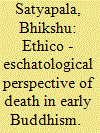

|
|
|
|
|
| Summary/Abstract |
The title of this paper as it suggests, mainly aims to deal with an important issue of human life i.e., death which has been in the focus from the centuries in philosophical circles though it is still an unresolved mystery obfuscating the human mind. The famous scripture Bhagavadgðta thus runs untiringly, “just as an embodied soul attains childhood, youth and old age through the body, so it attains another body after death. This Self is never born, nor dies ......”. This view of death subsumes the existence of the soul firstly and eternality of the same secondly. However, all religions of the world barring a few like Buddhism, do not describe the death as a horrified and unpleasant dagger hung over the humanity, rather they interpret death as an inevitable phenomenon that does not disturb a being’s existence. Accordingly different theories sneaked through the ever - long and endless speculations over the centuries, but to no avail. Regardless of it the misery of death continues its sway over humanity.
|
|
|
|
|
|
|
|
|
|
|
|
|
|
|
|
| 3 |
ID:
145907
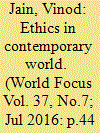

|
|
|
|
|
| Summary/Abstract |
Ethics took shape in two different ways. One, in ancient times, when humans in order to understand environment started asking questions and kept trying to answer them by arguments and conjecture. This took them to what we now know as the religious path. In those earlier times religion suggested how human society began. At that time laws governing human behaviour were made in the name of God. At that time the concept of morality also went in the name of God. Two, in recent times, that is, during the last few hundred years, development of science based knowledge in a vast variety of fields developed a scientific world view. This world view was not based on opinions based on limited knowledge. This was based on knowledge that was huge, was verifiable and was expanding.
|
|
|
|
|
|
|
|
|
|
|
|
|
|
|
|
| 4 |
ID:
145890
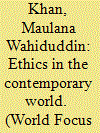

|
|
|
|
|
| Summary/Abstract |
According to my study, all the religions have two different aspects to them – theology and the moral scheme. Theology means the set of beliefs or doctrinal base of a religion, in other words, the inner contents of a religion. In terms of theology, there are differences between religions. For example, some religions have the monistic concept of God, while other religions believe in the monotheistic concept of God. Differences of this kind have always been the subject of discussion among theologians and no doubt, they will continue to be so in the future. But like other intellectual discussions about differences, they are basically confined to scholars, having nothing to do with the common people. Common people can live their daily lives without concerning themselves with or even without knowing about these issues. These issues are concern of a few individuals and not of the masses of any society.
|
|
|
|
|
|
|
|
|
|
|
|
|
|
|
|
| 5 |
ID:
145892
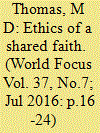

|
|
|
|
|
| Summary/Abstract |
Taking into consideration the lives of human beings, what is the raison de'tre of faith? Can faith or religion ever be a cloistered phenomenon? If not, what are its social characteristics and interfaith implications? Does it have any essential linkage with ethics and if yes, what are the ethical imperatives of a shared faith? In fact, the root meanings of the words 'faith and religion' suggest a perception of life that is necessarily dynamic and relational. They are loaded with a wide range of in-depth implications. They aren't merely pious ideas that may or may not have any bearing on one's life. They are in effect ethical directives that are oriented to motivate and empower believers, in favour of scaling higher and larger degrees and dimensions of life.
|
|
|
|
|
|
|
|
|
|
|
|
|
|
|
|
| 6 |
ID:
122486
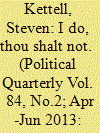

|
|
|
|
|
| Publication |
2013.
|
| Summary/Abstract |
Proposals to legalise same-sex marriage have provoked one of the most high-profile and controversial political debates in recent years. The plans, being introduced by the governments at Westminster and Holyrood, have divided political and public opinion and have attracted widespread opposition from religious groups. However, while religious attitudes to homosexuality are shaped by theological concerns, religious justifications have been largely absent from the case against same-sex marriage. Instead, religious groups have presented their arguments in secular terms centred on tradition, social utility, democratic values and the threat to religious rights and freedoms. This particular framing of the issue reflects processes of secularisation, a growing use of identity politics and the composition of religious groups themselves.
|
|
|
|
|
|
|
|
|
|
|
|
|
|
|
|
| 7 |
ID:
145891
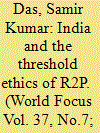

|
|
|
|
|
| Summary/Abstract |
India’s foreign policy in the post-Cold War period has become a subject of one of the most acrimonious debates in her recent past history. While it is often denigrated as ‘firefighting’, ‘ad hocism’ and ‘drift’, many other commentators propose to interpret it as one driven by realpolitik interests paying scant regard to her ideological and ethical commitments. Never before in her history has Indian foreign policy faced such an ethical crisis as it is facing now.
|
|
|
|
|
|
|
|
|
|
|
|
|
|
|
|
| 8 |
ID:
167976
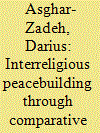

|
|
|
| 9 |
ID:
112368
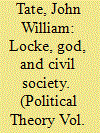

|
|
|
|
|
| Publication |
2012.
|
| Summary/Abstract |
Timothy Stanton is the latest in a line of Locke scholars who, in focusing on Locke's theological commitments, have sought to place these at the center of his political philosophy. Stanton insists that those who interpret Locke's political philosophy in more material terms, centered on individual liberty, government authority, and the need to reconcile both via consent, apply to it a misleading "picture" and fail to perceive its essentials. By showing that this is precisely how Locke himself intended his political philosophy to be understood, with the theology substantially removed, this article shows how Stanton is profoundly mistaken in his interpretation of Locke.
|
|
|
|
|
|
|
|
|
|
|
|
|
|
|
|
| 10 |
ID:
176499
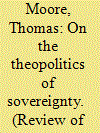

|
|
|
|
|
| Summary/Abstract |
This article considers how we can develop a reflexive reading of the theological contours of global politics through Carl Schmitt's account of sovereignty. In doing this it seeks to generate a critical architecture to understand the pluralistic registers of sovereignty within world politics. This article examines the theological dimensions of sovereignty, calling for a closer reading of the theopolitical discourses of legality and legitimacy at work within the largely secular discipline of International Relations. Tracing the pluralistic dimensions of sovereignty – juristic, popular, and theopolitical – allows us to see how sovereignty is operationalised through a range of distinct political registers. When the study of sovereignty is confused with questions of preference for modes of governing (whether secular, religious, democratic, and/or juristic) the complex historical sociology of sovereignty is overlooked. Contemporary scholarship in International Relations can benefit from closer engagement with the multiple, overlapping registers of sovereignty in global politics. We may disagree with Schmitt's reading of sovereignty as ‘theopolitics’ but there is real methodological value in engaging secular scholarship in thinking about religion as a constitutive domain for global order – alongside a rich range of critical approaches.
|
|
|
|
|
|
|
|
|
|
|
|
|
|
|
|
| 11 |
ID:
121857
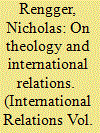

|
|
|
|
|
| Publication |
2013.
|
| Summary/Abstract |
In previous periods, scholarship about international relations often drew on writing in theology, as well as more familiarly, history, law or philosophy. Some very influential scholars of international relations - think of Rheinhold Niebuhr, Martin Wight and Herbert Butterfield - were extremely widely read in theological topics, and their theological concerns influenced their understanding of international relations. This article looks at some contemporary writing with overtly theological concerns and asks how might contemporary international relations scholarship benefit from an engagement with contemporary philosophical and political theology.
|
|
|
|
|
|
|
|
|
|
|
|
|
|
|
|
| 12 |
ID:
029361
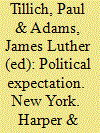

|
|
|
|
|
| Publication |
New York, Harper & Row Publishers, 1971.
|
| Description |
xx, 187p.
|
|
|
|
|
|
|
|
|
|
|
|
Copies: C:1/I:0,R:0,Q:0
Circulation
| Accession# | Call# | Current Location | Status | Policy | Location |
| 007424 | 291.17/TIL 007424 | Main | On Shelf | General | |
|
|
|
|
| 13 |
ID:
101306
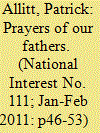

|
|
|
| 14 |
ID:
184132
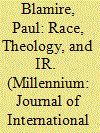

|
|
|
|
|
| Summary/Abstract |
This article introduces the work of black liberation theologian James H. Cone into the mutual silence between the study of race and the study of Christian theology in IR. Despite the theological roots of the colonial-modern idea of race, these areas of study in IR have mostly been approached separately. Cone’s thought responds to the complicity of white supremacy and Christianity, whilst theorising a theology of black liberation. It is thus witness and testament to the redemptive potential of a theological frame, inviting us to think beyond secular reason. Cone’s thought raises important theological questions about universality, a central stake for IR discussions of Christian theology. This article identifies supersessionism, the idea that Christianity supersedes both Judaism, and any particularity (as a potentially universal salvific community), as a key notion in the enlightenment secularisation of theological thought, and the development of a racialised colonial modernity that modelled itself in part on Christianity’s longstanding anti-Semitism. This article opens an engagement with Cone’s work for discussions of both Christian theology and race in IR, pointing to the innermost doctrines of Christianity as a site of tension at which race thinking and Christianity are connected, and at which they might be de-linked.
|
|
|
|
|
|
|
|
|
|
|
|
|
|
|
|
| 15 |
ID:
070782
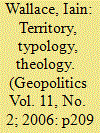

|
|
|
|
|
| Publication |
2006.
|
| Summary/Abstract |
This paper explores the complexities of the relationship between God and territory as they are developed within the Christian scriptures. It traces the multiple layers of meaning that are developed as the theological narrative which links God to a particular "chosen people" in a "promised land" (ancient Israel) is transformed into one which links God in Christ to a worldwide transterritorial community ("the people of God"). Theological analysis demonstrates different typological interpretations that have been subject to ideological selectivity in their historical appropriation by "Christian" nations, particularly the United States. The religious background to contemporary geopolitical claims by the Bush administration, framed by avowedly biblical justification, is dissected.
|
|
|
|
|
|
|
|
|
|
|
|
|
|
|
|
|
|
|
|
|